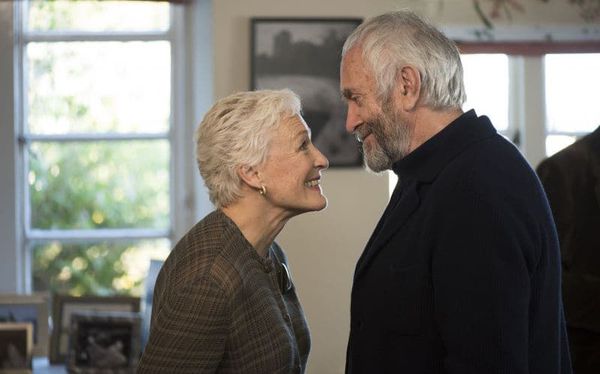Sunday, 7 October 2018
Her story: "The Wife"
The set-up of The Wife, taken from Meg Wolitzer's novel, suggests no more nor less than a middlebrow mother!. Introduced receiving the notification for his Nobel Prize, there is a literary sacred monster - Joseph Castleman, played by Jonathan Pryce as an extension of his Roth-like tyrant in 2014's Listen Up Philip - who apparently holds the world in his hands like one of his beloved walnuts, and with that the power to crush its contents. Absorbing some of that pressure, there is his other, almost certainly better half Joan (Glenn Close). Joan entered the Joseph Castleman universe as an object of lust, a gleaming blonde trophy to be won and displayed: flashbacks reveal how her bright literature student was recruited, with no little condescension, as a babysitter for Professor Joseph and his first wife, then as a replacement for said wife once the marriage hit the rocks. Since then, she's largely been resigned to her fate as a meekly smiling support act in public and full-time nurse in private, keeping hubby's unruly appetites in check, quietly forgiving him his lapses, and reminding him to take the pills that will get him through his next magnum opus. The pair set off on their Stockholm jaunt with this tried-and-tested routine, this unified front, in place; by the end of it, the balance of power in this relationship will have been completely overturned.
Such a synopsis may lead you to expect incendiary, revolutionary cinema - something closer to what mother! was, perhaps. In actuality, Björn Runge's adaptation builds in small, considered, generally persuasive increments. Its virtues are distinctly classical: Jane Anderson's screenplay uses the three-day weekend of the Nobel ceremony as three acts in which the status quo of this marriage is set out, tested, and finally changed forever by a number of forces. Joseph, for one, is caught paying more attention to his personal photographer (a twentysomething brunette with Delevingne brows) than he does to his son David (Max Irons), an aspirant scribe with a short story that awaits critiquing and a quietly felt need for paternal affirmation; Joan, meanwhile, is buttonholed by a journalist (Christian Slater) digging into the couple's background for possible use in relation to a forthcoming biography. Writers upon writers upon writers: every which way you look in this film, you risk being slapped round the face with a manuscript, an outsized ego, or an awards-worthy word choice. (No surprise critics have admired the film so: it is to our world what A Star is Born must be to those in showbusiness, savvy to the best and worst of us.)
Yet Anderson burrows inwards with writerly perception, taking us behind the scenes of the Nobel as she gets under the skin of this relationship, and Runge's direction doubles down on the interiority - because, it turns out, he had to double down on it. There's a reason why the film leans heavily on close-ups and medium shots, and why Joe and Joan Castleman are driven from hotel to function suite in cars whose windows are conspicuously misted up: a story set out by Wolitzer in Connecticut and Stockholm was apparently filmed in Glasgow, presumably for financing reasons. You'd never guess, however, and one of those close-ups may yet win Close the Oscar: a single, quite remarkable twenty-second hold on Joan's face, inserted during Joseph's acceptance speech, during which we witness this woman's quiet pride in her husband's achievements subsumed by a bubbling, lava-like ire she's had to keep down for the best part of three decades. Such tight scrutiny proves rather better for the leads than it does the supporting cast. Annie Starke, Close's real-life daughter, is very good as the younger Joan, thanklessly tamping down her own ambitions for the betterment of the so-called great man she falls for; it's a performance that explains the rage in Close's gaze, a return of something long repressed. Yet Irons is less responsive as David, as is the blustery Harry Lloyd as the younger Joseph - although there are reasons, uncovered late in the day, why Runge may have cast a thin slip of a thing in the part.
Still, none of this matters whenever the film is rearranging the occupants and plush furnishings of a Stockholm hotel suite into the basics of Bergmanian theatre: a husband and wife yanked unceremoniously out of their comfort zone, and forced to confront their own histories in a moment of transition, armed only with a combustible mixture of powder-dry affection and flinty frustrations. The film around these messy emotions can seem overly neat and tidy in places, inserting its flashbacks with tweezers and carefully acknowledging its narrative and visual symmetries; it's finally the polar opposite of the splurgy, expressionistic Aronofsky film, which may be why it's been so embraced by audiences, and why it may yet end up among this year's foremost prizewinners. Yet Runge - who broke through on British screens with the perfectly respectable ensemble drama Daybreak back in 2003, went AWOL thereafter, and may now deserve the gong for the year's most self-effacing job of direction - habitually selects the right takes and makes the right cuts to lend what is a generally well-made picture an unusual emotional amplitude and dynamism. A useful question to mull over on the walk back to the car park: just how much input did his own wife have?
The Wife is now playing in selected cinemas.
Subscribe to:
Post Comments (Atom)

No comments:
Post a Comment